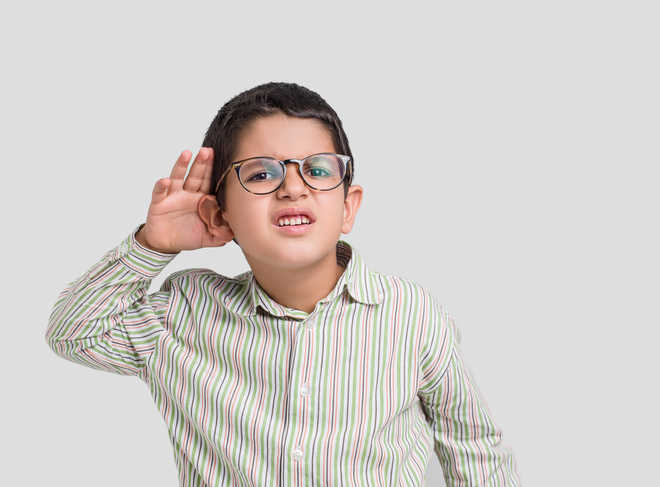
For their ears only: Although response to sound indicates a child’s sense of hearing, but he/she may not hear all sounds; and (below) usually, about 30 per cent to 40 per cent of Indian children with hearing loss are treated with hearing aids
Dr Sanjay Munjal
Out of every 1,000 newborns in India, an estimated five to six babies suffer from some degree of hearing loss. Given our country’s high birth rate, this translates into thousands of children born with hearing loss in the country. Added to this vast number are many more children who develop hearing loss during their childhood. The situation is further compounded by a number of misconceptions among parents. These fallacies usually act as a barrier to early diagnosis and treatment. As a result, far too many children with hearing loss are identified or treated after the ‘critical period’ for development but by then significant damage has already occurred.
Some misconceptions about childhood hearing loss in India.
False: Delayed speech does not indicate hearing loss.
Fact: Although delayed speech is the first indicator of hearing loss in children, parents do not take this seriously. They believe that the child will start speaking eventually. Even when parents do suspect that delayed speech could be because of hearing loss, they still wait for some more months hoping that the child will start talking at some point. After that, many parents, instead of seeking medical help from a licensed doctor, take their child to local unqualified practitioners.These individuals rely on alternative medicine or prescribe medication that is not backed by any clinical evidence.
False: Home remedies can cure hearing loss.
Fact: In the case of suspected hearing loss or an ear infection, most parents try home remedies such as treating the ear with hot oil or manually cleaning the ear to reduce ear wax. These practices do more harm than good and can even irreversibly damage the ear.
False: Response to sounds means there is no hearing loss.
Fact: While it is true that response to sounds is indicative of a child’s developing sense of hearing, parents must understand that medically the degree of hearing loss is tested over a spectrum. This means that the child may hear some sounds but not all , and could still have some degree of hearing loss.
Major causes
“But how did this happen?” This is a question frequently asked by parents whose children are diagnosed with hearing loss. There are several factors that contribute to childhood hearing loss, some of which occur before a child is born (congenital), others problems may occur after birth (acquired hearing loss). Some leading causes of childhood hearing loss are:
n A viral infection or high-grade fever during pregnancy, especially in the first trimester.
n Any physical trauma to the foetus/womb during pregnancy.
n Use of ototoxic drugs (drugs that are toxic or damaging to the ear, eg: antibiotics like gentamicin and some chemotherapy drugs) by the mother during pregnancy.
n Maternal malnutrition.
n Premature birth or a head and/or ear injury during birth.
n Low birth weight (less than 1500g).
n Infectious diseases during childhood such as meningitis, measles, mumps or chronic ear infections.
When to seek medical help
Ideally every new-born baby should be tested for hearing loss (some developed countries follow this practice) to detect hearing loss at the earliest. Screening for hearing loss should again be done at one month and three months of age, by which point doctors ascertain if a child has hearing loss and requires treatment intervention. Usually, about 30 per cent to 40 per cent of Indian children with hearing loss are treated with hearing aids. Many children, who do not show improvement with hearing aids, can greatly benefit from the use of a cochlear implant. It is a surgically implanted electronic device that restores hearing in children with profound or severe hearing loss.
Ultimately, every parent wants their child to be able to see, hear, feel and enjoy the wonders of this world. All parents should get screened their new-born babies for hearing loss and get it treated at an early stage (preferably before the age of two). This simple step can ensure that a child grows up to be a well-adjusted adult, at par with his or her normal hearing peers. So parents should not hesitate or delay if their child shows signs of delayed speech, responds inconsistently to sounds, is inattentive or responds incorrectly to simple questions, you must get his or her hearing tested.
— The writer is additional professor and in charge, speech and hearing unit, Department of Otolaryngology,
PGIMER, Chandigarh



























